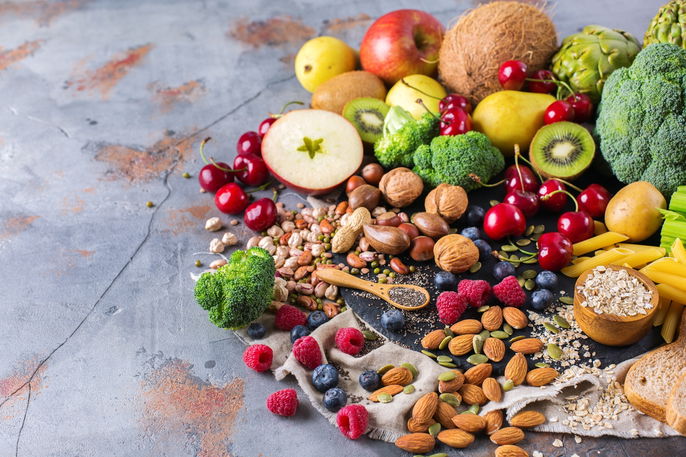A low cholesterol diet is typically low in saturated and trans-fat and sugar free. It aims to improve blood circulation and reduce the risk for the accumulation of fat in the blood, which can prevent cardiovascular diseases like heart attacks and stroke.
In addition, it is important to increase your consumption of fruits, vegetables and whole grains. These foods are high in giber, which can regulate cholesterol levels and decrease fat absorption in the gut.
It is important for this type of diet to be combined with regular physical activity, at least 3 times a week for 1 hour. Exercise promotes weight loss and muscle gains, which can also lead to decreased cholesterol levels and better overall heart health.

Foods to eat
Foods that are appropriate for a low cholesterol diet include:
- High fiber foods, like oats, whole wheat bread, whole grain rice, whole grain pasta and whole wheat flours (e.g. carob flour, almond flour and buckwheat flour)
- Fruits and vegetables, preferable raw and with the peel to increase fiber content. You should aim for 3 to 5 portions per day.
- Legumes, like beans, chickpeas, lentils and soybeans, at least twice a day.
- Nuts like walnuts, almonds, Brazilian nuts and peanuts. Not only are these high in giber, but they contain HDL, or good cholesterol. They should be consumed in moderation, however, as they are high in calories.
- Skim milk and dairy products, white, low fat cheeses, and natural, sugar-free yogurts.
- Lean white meat like chicken, fish and turkey.
Foods should be boiled or steamed when possible, and you should avoid fried food, stews, and ready-made sauces and spices. You can flavor your food using natural spices, like rosemary, oregano, coriander or parsley.
It is also important to drink around 2.5 L of water per day, and to aim for 3 meals and 2 snacks per day.
There are some foods with specific properties that can be included in your low cholesterol diet as a means to manage cholesterol levels. These include:
There are also some natural herbs that can be used for tea to lower cholesterol, such as artichoke tea and dandelion tea.
Foods to avoid
Some food can lead to a higher LDL level, as they are rich in saturated fat, trans fat and/or sugar. These foods should be avoided or eaten in moderation, and include:
- Animal organ meat, like liver, kidneys and heart
- Sausages and fatty cold cuts, like hot dogs, chorizo, bacon, salami and prosciutto
- Fatty cuts of red meat
- Whole milk, yogurt with added sugar, butter and margarine
- Yellow cheese and cream cheese
- Sauces like ketchup, mayonnaise, aioli, and barbeque sauce
- Oil and fried foot in general
- Processed food, frozen food and fast food
- Alcohol
In addition, foods that are high in sugar, like cakes, cookies and chocolate, should not be consumed or just eaten in moderation. Its high sugar contents accumulate as fat in the body, which promotes the production of cholesterol in the liver.
Low cholesterol diet meal plan
The following table outlines a 3-day meal plan for a low cholesterol diet:
The quantities indicated above will vary depending on age, sex, activity level and health status. Therefore, you should see a registered dietitian for a more detailed assessment and customized meal plan that meets your needs.
Do eggs increase cholesterol levels?
Egg yolks are rich in cholesterol, although foods that naturally contain cholesterol have a low risk for causing cellular damage. This type of cholesterol is different from the cholesterol found in processed food.
The American Heart Association recommends healthy people to consume 1 to 2 eggs per day, while people with diabetes or a history of heart disease should consume only 1 per day. Therefore, it is fully possible to include eggs in a low cholesterol diet, as long as they are not eaten excessively.






























